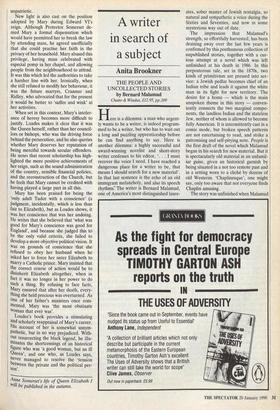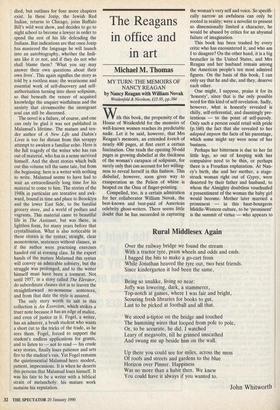A writer in search of a subject
Anita Brookner
THE PEOPLE AND UNCOLLECTED STORIES by Bernard Malamud Challo & Windus, £12.95, pp.269 Here is a dilemma: a man who urgent- ly wants to be a writer, is indeed program- med to be a writer, but who has to wait out a long and puzzling apprenticeship before he can find anything to say. Here is another dilemma: a highly successful and award-winning novelist and short-story writer confesses to his editor, `, . . I must recover the voice I need. I have reached a dangerous place for a writer to be, that means I should search for a new material'. In that last sentence is the echo of an old immigrant melancholy, and also its speech rhythms. The writer is Bernard Malamud, one of America's most distinguished laure- ates, sober master of Jewish nostalgia, so natural and sympathetic a voice during the Sixties and Seventies, and now in some mysterious way out of date.
The impression that Malamud's strength, so effortfully harvested, has been draining away over the last few years is confirmed by this posthumous collection of unpublished stories, together with a cur- ious attempt at a novel which was left unfinished at his death in 1986. In this preposterous tale, set in the 1870s, two kinds of primitivism are pressed into ser- vice: a Jewish pedlar becomes chief of an Indian tribe and leads it against the white man in its fight for new territory. The desire for a home — which is the main unspoken theme in this story — conven- iently connects the two marginal compo- nents, the landless Indian and the stateless Jew, neither of whom is allowed to become fully American. It is intermittently cast in a comic mode, but broken speech patterns are not entertaining to read, and strike a patronising and self-pitying note. People is the first draft of the novel which Malamud began in his search for new material. But it is spectacularly old material in an unfamil- iar guise, given an historical garnish by being situated in a not too remote past and in a setting worn to a clich6 by dozens of old Westerns. `Chaplinesque', one might say, only too aware that not everyone finds Chaplin amusing.
The story was unfinished when Malamud died, but outlines for four more chapters exist. In these Jozip, the Jewish Red Indian, returns to Chicago, joins Buffalo Bill's wild west show, and decides to go to night school to become a lawyer in order to spend the rest of his life defending the Indians. But indications are that once Jozip has mastered the language he will launch into an autobiography, whether the Indi- ans like it or not, and if they do not who shall blame them? 'What you say may answer their own questions about their own lives'. This again signifies the story as told by a rootless man: the wearisome and essential work of self-discovery and self- authorisation turning into sheer solipsism, so that beneath the veneer of acquired knowledge the unquiet wistfulness and the anxiety that circumscribe the immigrant soul can still be discerned.
The novel is a failure, of course, and one can only be glad it was not published in Malamud's lifetime. The mature and ten- der author of A New Life and Dubin's Lives is too far distant from this scrappy attempt to awaken a familiar echo. Here is the full tragedy of the writer who has run out of material, who has in a sense survived himself. And the short stories which bulk out this volume tell the same tale, but from the beginning: here is a writer with nothing to write. Malamud seems to have had to wait an extraordinarily long time for his material to come to him. The stories of the 1940s in particular are tentative and awk- ward, bound in time and place to Brooklyn and the lower East Side, to the familial grocery store, and a world of pedlars and vagrants. This material came to beautiful life in The Assistant, but was there, in lightless form, for many years before that crystallisation. What is also noticeable in these stories is the syntax; straight, clear monotonous, sentences without clauses, as if the author were practising exercises handed out at evening class. In the expert hands of the mature Malamud this syntax will convey an admirable sobriety, but the struggle was prolonged, and to the writer himself must have been a torment. Not until 1957, in a story called The Elevator, do subordinate clauses slot in to leaven the straightforward no-nonsense sentences, and from that date the style is assured.
The only story worth its salt in this collection is An Exorcism, which strikes a truer note because it has an edge of malice, and even of justice in it. Fogel, a writer, has an admirer, a brash student who wants a short cut to the tricks of the trade, as he sees them. Fogel, forced to support the student's endless applications for grants, and to listen to — not to read — his crude sexy stories, finally loses patience and sets fire to the student's van. Yet Fogel remains the quintessential Malamud hero: modest, patient, impecunious. It is when he deserts this persona that Malamud loses himself. It was his fate to be a writer with a biblical strain of melancholy: his mature work sustains his reputation.



















































 Previous page
Previous page